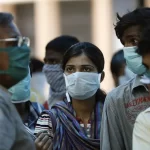Every other person is suffering from prolonged post-viral cough, shortness of breath, and wheezing. One victim has already perished in Karnataka due to the H3N2 influenza virus subtype.Flu cases have been reported in January, February, and March in northern India.
According to Dr. Sandeep Budhiraja, Group Medical Director of Max Healthcare and Senior Director of the Institute of Internal Medicine, the symptoms of this year’s influenza virus strain are a bit distinct and more severe than in previous years.
“Many patients complain of a persistent cough or episodes of cough that continue for several days or even weeks after the flu has subsided. The months of February and March are typically free of influenza cases in North India. Until now, we have received a large number of cases. According to Dr. Sandeep Budhiraja, seasonality has grown in the majority of nations.
The majority of these cases are attributable to the H3N2 virus, a type of influenza A virus that is severe but not as epidemic as the fatal H1N1 virus (swine flu).
WHAT IS H3N2 influenza VIRUS?
The H3N2 virus belongs to the influenza A virus family. It is an annual respiratory viral infection that induces illness. This subtype of the influenza A virus was identified in humans in 1968.
The virus derives from hemagglutinin (HA) and neuraminidase protein strains of the influenza A virus (NA). HA has over 18 subtypes, designated H1 through H18, whereas NA has 11 subtypes, numbered N1 through N11. The H3N2 is a combination of the two influenza A virus protein strains.
The virus is derived from influenza protein strain varieties. A virus – hemagglutinin (HA) and neuraminidase (NA).
WHAT ARE THE SYMPTOMS OF H3N2 VIRUS?
H3N2 virus symptoms include cough, runny or stuffy nose, sore throat, headaches, body pains, fever, chills, fatigue, diarrhoea, vomiting, and shortness of breath.
WHAT PRECAUTIONS SHOULD YOU TAKE TO PREVENT H3N2 VIRUS?
To prevent any form of viral infection, preventative measures include vaccination. Sanitize your surroundings by frequently cleansing your hands with soap. Avoid contact with sick or mask-wearing individuals. As the viral infection is contagious, it is wise to shield your mouth when sneezing or coughing.
WHAT TREATMENT IS AVAILABLE FOR H3N2 VIRUS?
The treatment for H3N2 virus is quite simple: individuals should drink more fluids and stay hydrated. Common over-the-counter remedies for fever, cough, and migraines can be used to alleviate symptoms. Vaccinations against the influenza virus should be administered and received annually around this time. If symptoms are severe, it is recommended to see a doctor.




